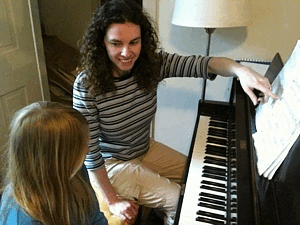
Hello, New Yorkers!
I’m excited to teach you to play the piano. I’ve been teaching piano for 25 years and have taught students of all ages and many different backgrounds. Though I talk differently to children and adults, my principles of teaching are the same. I believe that anyone can learn to play the piano. It requires steady focus over a period of time — I don’t believe in shortcuts — and your reward for your diligent effort is the joy of playing your own music. My goal for you is to develop confidence as well as musical skill and knowledge.
I think of playing the piano as an athletic activity for your hands, wrists, and fingers. It also involves an awareness of body position, breathing, and posture as you sit, as well as your use of your legs and feet to support. It is a whole-body activity! I’ll create exercises specifically for you to overcome your unique challenges.
I’ve always felt that music is a clear language. Through playing the piano, we express beauty, energy, soul, movement, rhythm, melody, harmony, and more. It is an area of life where anyone can learn to express themselves. I love to watch students of all ages develop their individuality through playing the piano.
One of the key differences between jazz and classical piano music is that we often play jazz tunes that were not originally written for the piano, whereas classical piano music is about the instrument. That is why I feel a well-rounded pianist studies both the jazz and classical traditions. Through learning jazz piano — including improvisation and ear training and harmonies and groove — we learn lessons of musicianship and creativity and working together with others. Through learning classical piano, we cultivate precision and refinement, and we discover the potential of this powerful instrument.
Wherever you are in your piano journey, I would be excited to talk with you and see what I can do to help you along your way!


My Students' Accomplishments
Here are some of the schools and musical ensembles where my students have been accepted and participated:
~ Berklee College of Music
~ Lafayette College Jazz Ensemble
~ Princeton High School Jazz Bands
~ Montgomery High School Jazz Band
~ Montgomery Middle School Jazz Band
~ NJ State Regional Jazz Band
~ Rutgers Summer Jazz Institute
- Plainfield Academy of the Arts
~ Church performances
~ School talent shows
~ Many recitals and sing-alongs!
Check out my reviews on manta.com from current and former students!
Student Feedback
From a Jazz Piano Day Camp student:
"I've learned how to read chords and improvise. The classes were fun, and the variety of students that I met with were really cool. I liked that there was an art class at the end of the day. I made a lot of friends. My hand-eye coordination skills have gotten better, and I liked the songs that we learned. The teachers taught very well, everyone was friendly there, and it was a great experience. I liked the teachers' technique of showing us how to listen to music and then describe the music through drawing and painting. It made me like jazz even more.
I like how jazz starts off slow and then it improvises and it just keeps going. I love the energy it gives. Now that I have learned how to improvise, it's really fun to play on the piano.
Most of all, this class has brought me to a higher level of understanding and loving jazz more than before.
Once again I do not have enough words to express my gratitude towards you for sharing with me your love for the arts. This has been an awesome experience that I will never forget."
From a piano student:
"If it wasn't for the knowledge you gave me I would not be going to Berklee."
Piano Lessons Q & A
Q. What do I need for practicing?
A. A real, acoustic piano is ideal, but a digital keyboard can also work to start. If you or your child becomes serious about learning the piano, you'll eventually have to get an acoustic instrument.
You also need time. Daily practice time should cover the duration of your lesson. Five days a week is ideal, three is minimal.
Q. How long will it take me to be able to play nice songs, or cool jazz, for friends and family?
A. If you do your assignments diligently, you can reach this goal in two years.
Q. My child has trouble sitting still and focusing. Will he or she be able to learn the piano?
A. Learning a musical instrument is a wonderful way to develop focus! I encourage you to try it and witness the benefits over time.
Have more questions? Email me!